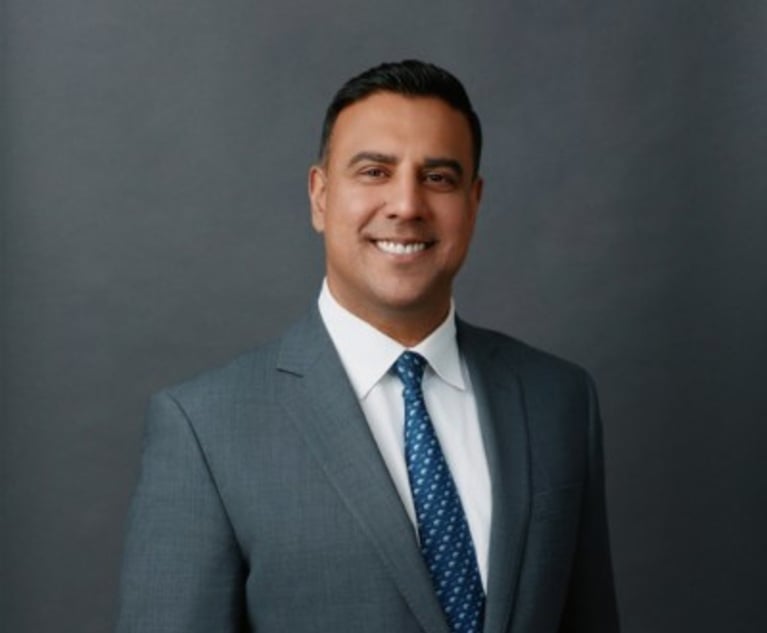FCA enforcement: the direction of travel
This article looks at some of the key recent changes in financial services regulation and the likely future direction of enforcement
June 11, 2018 at 05:22 AM
6 minute read
Financial services regulation has seen significant changes in recent years. And it is not only the regulation itself that has changed. The architecture to enforce it has also changed, from the implementation of the Senior Managers and Certification Regime (SMCR) to the changes to the enforcement process and practices. Here, we look at some of the changes that we as practitioners have seen on the ground, as well as setting out what we consider to be the likely future direction of enforcement.
 For some period now, the Financial Conduct Authority (FCA) has wanted to hold individuals more accountable than previously. While the FCA has successfully taken action against individuals in the past, it wants now to secure disciplinary outcomes against more senior individuals for failings on their watch. While the SMCR is a new weapon in its arsenal towards that, in many ways, in terms of enforcement, it changes little. It is interesting to see that the FCA and the Prudential Regulation Authority hailed their recent fining of Barclays CEO Jes Staley as the first case brought under the new SMCR regime. In reality, however, this was not an SMCR case at all. The trumpeting of it as such further emphasises the desire of the FCA to secure SMCR disciplinary outcomes. There is a lead time, and we will no doubt see SMCR cases coming down the track.
For some period now, the Financial Conduct Authority (FCA) has wanted to hold individuals more accountable than previously. While the FCA has successfully taken action against individuals in the past, it wants now to secure disciplinary outcomes against more senior individuals for failings on their watch. While the SMCR is a new weapon in its arsenal towards that, in many ways, in terms of enforcement, it changes little. It is interesting to see that the FCA and the Prudential Regulation Authority hailed their recent fining of Barclays CEO Jes Staley as the first case brought under the new SMCR regime. In reality, however, this was not an SMCR case at all. The trumpeting of it as such further emphasises the desire of the FCA to secure SMCR disciplinary outcomes. There is a lead time, and we will no doubt see SMCR cases coming down the track.
As for the conduct of investigations, we have in recent times certainly seen investigations starting on lesser evidence than previously. This is unwelcome. While it is true that we have also seen a greater willingness to drop cases, the very fact of having been under investigation can unfairly cause real problems for subjects, for example for individuals in their future employment. This is a trend that we believe is set to persist.
An equally unwelcome trend is what appears to be a willingness of the FCA to interview earlier in the investigation than it had previously done. This willingness can also potentially lead to some real problems for subjects. For example, it can be especially problematic for individuals who have more limited access to documents than they would have done if the interview had come later in the process.
We will no doubt see SMCR cases coming down the track
Although interviews are taking place earlier in some investigations, a common complaint is the length of time investigations are taking. While it has been suggested that these delays are confined to the so-called 'legacy' cases dating from the financial crisis, that is not always the way it appears to the market. We are aware of cases where matters seemingly unaccountably go quiet for long periods. The brunt of the delay is often borne by individuals who may be placed on long-term suspension, or in the absence of any firm timeframe, are left in limbo, unable to move jobs. It is hoped that this trend will diminish, but we see no real sign of that at present.
Another trend is the increasing criminal track that cases take. This can lead to delays, especially where the Serious Fraud Office (SFO) is also involved. It is a matter of public record that, in the Barclays Qatar matter, the FCA intended in 2013 to fine Barclays, but the FCA's case is on hold pending the outcome of the SFO matter. Indeed, such has been the time taken in the SFO matter (its investigation started in 2012) that the civil litigation that the events spawned has also had to be postponed. The postponement was the result of an interesting case where Barclays, and this firm for the former CEO, John Varley, made contested applications to postpone the civil litigation pending the SFO trial.
 Privilege for firms' internal investigations still looms large over the enforcement landscape. The case of ENRC rather shook up many people's views of where the limits of privilege were factually. This was welcome news to the FCA, which was pushing for what many may previously have regarded as protected material. The ENRC appeal is due to be heard by the Court of Appeal in July. This will be a significant hearing. The direction of travel on privilege may well be largely shaped by what the Court of Appeal decides on privilege or, after it, the Supreme Court.
Privilege for firms' internal investigations still looms large over the enforcement landscape. The case of ENRC rather shook up many people's views of where the limits of privilege were factually. This was welcome news to the FCA, which was pushing for what many may previously have regarded as protected material. The ENRC appeal is due to be heard by the Court of Appeal in July. This will be a significant hearing. The direction of travel on privilege may well be largely shaped by what the Court of Appeal decides on privilege or, after it, the Supreme Court.
As for topics for future action, beyond SMCR more generally (and possibly culture and governance in particular), there are many candidates, and it is difficult to know where exactly action may come from. Nevertheless, here is our view of some of the candidates for enforcement action down the line:
One strong possibility is anti-money laundering (AML). AML remains an issue for the FCA, particularly in respect of high-risk jurisdictions, and we may well see action coming out of its thematic review of AML in capital markets. Data security and resilience is an area that is receiving an increasing focus. We think it may well be an area that receives attention and focus from enforcement too. Beyond that, pension transfer advice has also been receiving attention and, given some of what we are hearing, looks like a prime candidate for enforcement action. Another possibility is potential abuse in the wholesale financial markets, where the FCA has been talking about focusing attention beyond the historical emphasis on equities. We would not be surprised to see action in any of the fixed income, commodity or non-standard derivative markets.
Adam Epstein (pictured above right, top) heads the Financial Services: Contentious Regulatory and Enforcement team at Mishcon de Reya LLP. Katharine Bond (pictured above right, bottom) is a managing associate in the team. You can read more of our regulatory insights in our tri-annual bulletin, Enforcement Watch.
NOT FOR REPRINT
© 2025 ALM Global, LLC, All Rights Reserved. Request academic re-use from www.copyright.com. All other uses, submit a request to [email protected]. For more information visit Asset & Logo Licensing.
You Might Like
View All
Hogan Lovells Hires Team of Top White & Case Corporate and Finance Partners in Italy
2 minute read
Clifford Chance, Milbank Steer Yondr Group’s $900M Debt Financing in Malaysia

Kirkland, Paul Hastings, White & Case, Freshfields advise on Top German Deals
2 minute readTrending Stories
- 1'Lookback Window' Law for Child Abuse Cases Constitutional, State High Court Finds
- 2Troutman Pepper Says Ex-Associate Who Alleged Racial Discrimination Lost Job Because of Failure to Improve
- 3Texas Bankruptcy Judge Withdraws Ethics Complaint Against Jackson Walker
- 4Apply Now: Superior Court Judge Sought for Mountain Judicial Circuit Bench
- 5Harrisburg Jury Hands Up $1.5M Verdict to Teen Struck by Underinsured Driver
Who Got The Work
J. Brugh Lower of Gibbons has entered an appearance for industrial equipment supplier Devco Corporation in a pending trademark infringement lawsuit. The suit, accusing the defendant of selling knock-off Graco products, was filed Dec. 18 in New Jersey District Court by Rivkin Radler on behalf of Graco Inc. and Graco Minnesota. The case, assigned to U.S. District Judge Zahid N. Quraishi, is 3:24-cv-11294, Graco Inc. et al v. Devco Corporation.
Who Got The Work
Rebecca Maller-Stein and Kent A. Yalowitz of Arnold & Porter Kaye Scholer have entered their appearances for Hanaco Venture Capital and its executives, Lior Prosor and David Frankel, in a pending securities lawsuit. The action, filed on Dec. 24 in New York Southern District Court by Zell, Aron & Co. on behalf of Goldeneye Advisors, accuses the defendants of negligently and fraudulently managing the plaintiff's $1 million investment. The case, assigned to U.S. District Judge Vernon S. Broderick, is 1:24-cv-09918, Goldeneye Advisors, LLC v. Hanaco Venture Capital, Ltd. et al.
Who Got The Work
Attorneys from A&O Shearman has stepped in as defense counsel for Toronto-Dominion Bank and other defendants in a pending securities class action. The suit, filed Dec. 11 in New York Southern District Court by Bleichmar Fonti & Auld, accuses the defendants of concealing the bank's 'pervasive' deficiencies in regards to its compliance with the Bank Secrecy Act and the quality of its anti-money laundering controls. The case, assigned to U.S. District Judge Arun Subramanian, is 1:24-cv-09445, Gonzalez v. The Toronto-Dominion Bank et al.
Who Got The Work
Crown Castle International, a Pennsylvania company providing shared communications infrastructure, has turned to Luke D. Wolf of Gordon Rees Scully Mansukhani to fend off a pending breach-of-contract lawsuit. The court action, filed Nov. 25 in Michigan Eastern District Court by Hooper Hathaway PC on behalf of The Town Residences LLC, accuses Crown Castle of failing to transfer approximately $30,000 in utility payments from T-Mobile in breach of a roof-top lease and assignment agreement. The case, assigned to U.S. District Judge Susan K. Declercq, is 2:24-cv-13131, The Town Residences LLC v. T-Mobile US, Inc. et al.
Who Got The Work
Wilfred P. Coronato and Daniel M. Schwartz of McCarter & English have stepped in as defense counsel to Electrolux Home Products Inc. in a pending product liability lawsuit. The court action, filed Nov. 26 in New York Eastern District Court by Poulos Lopiccolo PC and Nagel Rice LLP on behalf of David Stern, alleges that the defendant's refrigerators’ drawers and shelving repeatedly break and fall apart within months after purchase. The case, assigned to U.S. District Judge Joan M. Azrack, is 2:24-cv-08204, Stern v. Electrolux Home Products, Inc.
Featured Firms
Law Offices of Gary Martin Hays & Associates, P.C.
(470) 294-1674
Law Offices of Mark E. Salomone
(857) 444-6468
Smith & Hassler
(713) 739-1250










